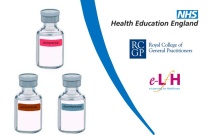The Role of the GP in Caring for Older People
Chantal Simon
0.50 Hours
Caring for older people is complicated by the challenges of multiple conditions, poor communication and atypical presentations. This session highlights these difficulties and aims to provide practical solutions to use in the GP surgery.
What is the Menopause
Heather Currie
0.50 Hours
This session explains the demographics, physiology, and consequences of the menopause and provides an insight into counselling women about the timing and effects of the menopause.
Sexually Transmissible Infections Diagnosis
Philippa Matthews
0.50 Hours
This session gives learners an overview of the clinical and microbiological diagnosis of STIs in the general practice context.
Talking with Parents
David Elliman and Helen Bedford
0.50 Hours
This session describes some of the issues that parents raise in relation to vaccines and the facts and attitudes appropriate to responding to them.
Syndromes and Pathology associated with Learning Disabilities
Tom Howseman MBBS, MRCGP - GP partner in Duston Medical Centre, Northampton.
0.50 Hours
This session describes the common syndromes associated with learning disabilities and their associated medical problems. Further resources to help with other conditions and the principle of diagnostic overshadowing are also discussed. This session was reviewed by Paresh Dawda and last updated on 24/05/13.
The Patient with Glaucoma
Stella Hornby - Module Editor: Eye Problems
0.50 Hours
This session provides core knowledge of the clinical features and management of different types of glaucoma in primary care. This session was reviewed by Paresh Dawda and last updated on 24/05/13.
Sleeping Part 2: Parasomnias in Childhood and Disturbed Sleep in Children with Disabilities
Helen Heussler - Developmental and Behavioural Paediatrician and qualified Sleep Physician, Mater Ch
0.50 Hours
This session follows on from the previous session Development and Behaviour/Sleeping Part 1: Normal Physiology and Common Problems and covers parasomnias, unusual sleep behaviours and sleep in children with disabilities.
The Social Context of Food
Lisa Holmes - Freelance Paediatric Dietitian
0.50 Hours
As healthcare practitioners we often feel we know what infants and young children should be eating, but the families we work with can experience barriers in putting this information into practice. In our day-to-day practice, we need to consider the social aspects of food and the effect that our environment has on our food choice....
Overview of Sepsis
Simon Stockley
This session is aimed at all out of hospital clinicians, GPs, Nurses, Pharmacists, Paramedics, Community Midwives and those providing urgent or unscheduled care. It will provide an introduction to key facts about sepsis and outlines the size of the problem, common community presentations and key actions that influence outcome....
The Vestibular System and its Connections
Tom Heaps
0.25 Hours
This session will cover the basic anatomy and function of the vestibular system and its connections.
Using Syringe Drivers in Palliative Care
Margaret Kendall
This session is designed to give you an overview of the different types of syringe driver available, and the different uses they have in the management of symptoms and end of life care. It will also dispel some myths and assumptions about the use of syringe drivers. This session was reviewed by Margaret Kendall & Christina Faull....
Symptoms and Signs of Pulmonary Embolism at Initial Presentation
David Keith Ward
0.25 Hours
This session highlights the wide range of clinical features that pulmonary embolus (PE) may precipitate in patients.
Shared Decision Making
Antony Chuter
This session deals with treating your patients as equal partners in the decisions reached about their treatment, while meeting clinical needs and desires.
The Purposes of Preoperative Visiting (anaesthesia)
John Carlisle
0.50 Hours
This session describes the preoperative visit. The visit confirms that the preadmission assessment service has prepared the patient, home and hospital so that scheduled surgery may proceed safely. The patient decides whether they are happy for you to anaesthetise them.
Vasoactive Agents (Inotropes)
Jeremy Bewley
0.50 Hours
This session will describe the classification of inotropes and list the indications for use, suitable for a trainee in the first two years of anaesthetic training.
Symptoms and Signs of Pulmonary Embolism at Initial Presentation
David Ward
0.25 Hours
This session highlights the wide range of clinical features that pulmonary embolus (PE) may precipitate in patients.
Understanding and Assessing Spiritual Need and Spiritual Distress
Wendy Greenstreet and Peter Richmond
This session considers the meaning of spiritual need and distress. It also addresses how to assess the spiritual needs of those receiving end of life care, and when and how this can be achieved.
Using Electronic Records
Michael Innes
0.50 Hours
This session covers issues and considerations regarding the use of a computer in the consultation room, drawing out the pros and cons as well as exploring where a computer is best placed within the room. This session was reviewed by Suchita Shah and last updated in January 2015.
Electrolytes
Matthew Saxton
This session will detail the physiology, derangement and management of the electrolytes, sodium and potassium within the body.
Teaching - Clinical Practice: Bedside or Opportunistic Moment
Asif Bachlani
0.50 Hours
This session is the third of three sessions which aims to describe the knowledge, skills, attitudes and behaviours needed to undertake a teaching role.
Thoracic Imaging Techniques
Mike Seed
0.75 Hours
This session discusses the variety of imaging techniques used to diagnose paediatric chest problems, including computed tomography (CT), magnetic resonance imaging (MRI) and ultrasound.
Tubes, Wires and Artefacts
Judith Foster
0.50 Hours
This session looks at many of the tubes, wires and artefacts seen on radiographs in paediatric patients.
Unilateral Hyperlucent Hemithorax
Rosemary Arthur
0.50 Hours
This session looks at asymmetrical translucency of the hemithorax in a child.
Skull Vault Lucencies and Bumps on the Head
Stephanie Mackenzie
0.50 Hours
This session covers the normal radiographic anatomy of the skull, variants of normal development that may simulate pathology, and common causes of skull vault lesions in childhood.
The Large Head Including Hydrocephalus
Neil Stoodley
0.50 Hours
This session will discuss the investigation and causes of an abnormally large or enlarging head (including hydrocephalus) in a child.
























